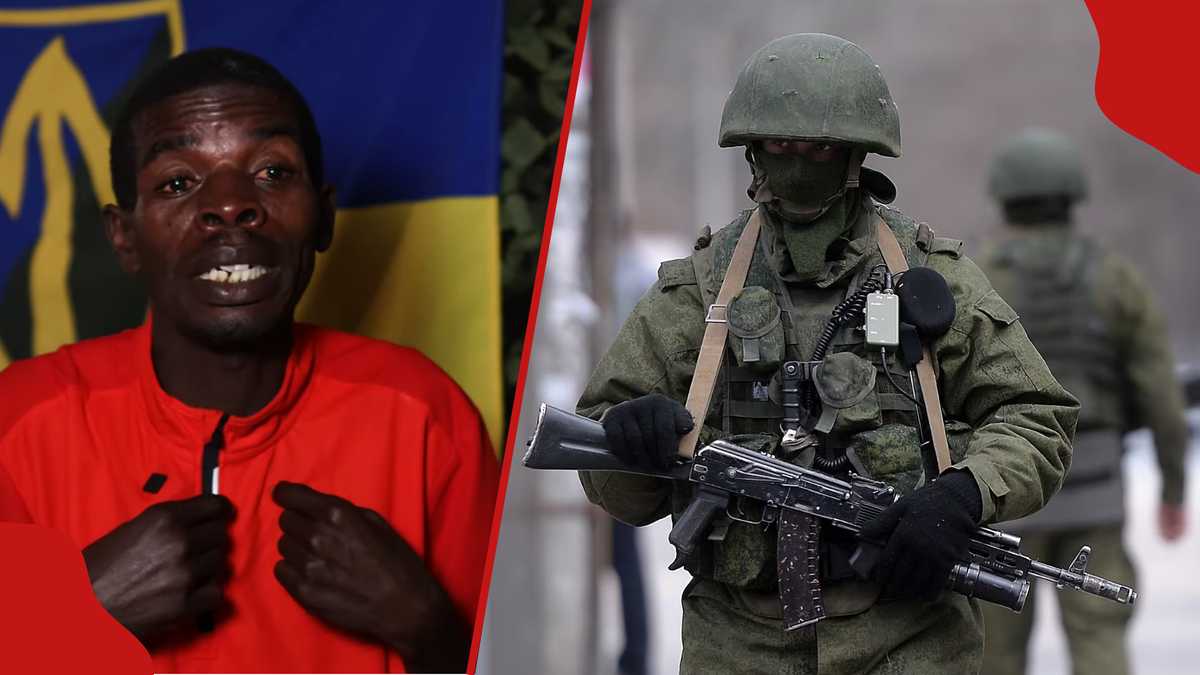International
‘Don’t shoot me’ – Kenyan athlete begs Ukrainian troops, says he was tricked into joining Russian Army

A young Kenyan athlete held captive in Ukraine has made an emotional plea not to be sent back to Russia, saying his life would be in danger if he returned.
“I will die there,” said 36-year-old Evans Kibet, his voice breaking as he waved his hands in the air during an interview filmed by Ukraine’s 57th Separate Motorised Infantry Brigade and released on Wednesday. The prisoner-of-war wore a red sports top, with the brigade’s flag pinned behind him.
Kibet, a long-distance runner, claims he was deceived into joining the Russian army and now longs to return home to see his 16-year-old daughter.
In a Facebook post alongside the video, the Ukrainian brigade said the case reflected how Moscow treats foreign recruits. However, it also noted that Kibet had “fought on the side of the enemy, so whether to believe the words and tears is up to your discretion.” The unit stressed the interview was conducted with his consent, though the BBC has not independently verified this.
Foreign nationals have appeared among Russian forces before, but it is rare for captured fighters to speak on camera. Petro Yatsenko, Ukraine’s spokesperson on prisoner-of-war affairs, told the BBC that captives currently include citizens of Somalia, Sierra Leone, Togo, Cuba and Sri Lanka.
“Most of these individuals come from poorer countries and end up on the Russian side in different ways,” Yatsenko said. “Some are deceived – promised jobs at factories – while others join the war voluntarily. Very few are captured alive; most are either killed or seriously injured.”
Back in Kenya, Kibet’s family has been left in shock. His cousin, Edith Chesoi, admitted she had been replaying the footage repeatedly in disbelief.“I am so traumatised. I didn’t sleep at night. I don’t even know what to say,” she said.
His younger brother, Isaac Kipyego, described him as “a humble guy and a man with a few words,” adding that he was a trusted pillar of the family.
Kibet’s passion for athletics defined much of his life. Raised in a farming family in Mount Elgon, he trained in Iten, the world-famous high-altitude town that has produced Olympians and champions. While he never broke into the top ranks, he competed in 10km and half-marathon races in Europe and Asia. “Kibet has been running since he was a child,” his brother said. “Running was his life.”
But financial struggles weighed heavily. Friends say he was eager for opportunities abroad. In March, he asked fellow runner Elias Kiptum to help him secure a race in Poland, but the team was already full. Later, when a sports agent offered him a trip to Russia to compete, Kibet seized the chance. His family says he left at the end of July with just a small suitcase, telling them he would be gone for two weeks.
On the Ukrainian video, Kibet recounts how the supposed opportunity turned into a nightmare. He insists he arrived in Russia as a visitor, not for a “military job.” But when his visa expired, his host offered to help.“In the evening, he came with some papers written in Russian. He told me: ‘This is the job I want you to do.’ I didn’t know it was a military job,” Kibet recalled. After signing, he said, his phone and passport were confiscated.“And that is how everything went wrong… that signing ruined my life.”
According to Kibet, he was forced into a military camp. “I was told: ‘Either you go to fight or we’ll kill you.’” He received a week of basic training, learning to handle an assault rifle through gestures rather than words. He maintains he never fought in combat. On his way to what would have been his first mission, he says he abandoned his gear and fled, wandering for two days in a forest near Vovchansk before surrendering to Ukrainian soldiers.
“I went there with my hands up,” he explained. “I said: ‘I am a Kenyan, please don’t shoot me.’ Everyone pointed their guns at me, but I told them to calm down. The commander came, they tied me. I told them: ‘No, I am unarmed… I’m here to save my life.’”
For his family, seeing him alive has brought both pain and relief. “We feel that he’s a bit safe [with them] rather than being in Russia,” Kipyego said. They are urging the Kenyan government to intervene, though the Ministry of Foreign Affairs has yet to respond.
Ukraine has indicated it is open to talks. “If the government of his country of origin expresses interest in his repatriation, Ukraine is open to negotiations about transferring him home,” Yatsenko said. But he added that “most African states show little interest in the return of such citizens.”
For Kibet’s loved ones, nothing matters more than his safety. “If he made a mistake, let them forgive him. We only want him back,” his brother pleaded.
(BBC)

























